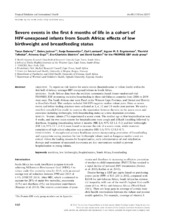| dc.contributor.author | Doherty, Tanya | en_US |
| dc.contributor.author | Jackson, Debra | en_US |
| dc.contributor.author | Swanevelder, Sonja | en_US |
| dc.contributor.author | Lombard, Carl | en_US |
| dc.contributor.author | Engebretsen, Ingunn Marie S. | en_US |
| dc.contributor.author | Tylleskär, Thorkild | en_US |
| dc.contributor.author | Goga, Ameena | en_US |
| dc.contributor.author | Ekström, Eva-Charlotte M | en_US |
| dc.contributor.author | Sanders, David | en_US |
| dc.date.accessioned | 2015-09-23T11:52:26Z | |
| dc.date.available | 2015-09-23T11:52:26Z | |
| dc.date.issued | 2014-10 | |
| dc.identifier.issn | 1360-2276 | |
| dc.identifier.issn | 1365-3156 | |
| dc.identifier.uri | https://hdl.handle.net/1956/10515 | |
| dc.description.abstract | Objective: To report on risk factors for severe events (hospitalisation or infant death) within the first half of infancy amongst HIV-unexposed infants in South Africa. Methods: South African data from the multisite community-based cluster-randomised trial PROMISE EBF promoting exclusive breastfeeding in three sub-Saharan countries from 2006 to 2008 were used. The South African sites were Paarl in the Western Cape Province, and Umlazi and Rietvlei in KwaZulu-Natal. This analysis included 964 HIV-negative mother–infant pairs. Data on severe events and infant feeding practices were collected at 3, 6, 12 and 24 weeks post-partum. We used a stratified extended Cox model to examine the association between the time to the severe event and covariates including birthweight, with breastfeeding status as a time-dependent covariate. Results: Seventy infants (7%) experienced a severe event. The median age at first hospitalisation was 8 weeks, and the two main reasons for hospitalisation were cough and difficult breathing followed by diarrhoea. Stopping breastfeeding before 6 months (HR 2.4; 95% CI 1.2–5.1) and low birthweight (HR 2.4; 95% CI 1.3–4.3) were found to increase the risk of a severe event, whilst maternal completion of high school education was protective (HR 0.3; 95% CI 0.1–0.7). Conclusions: A strengthened primary healthcare system incorporating promotion of breastfeeding and appropriate caring practices for low birthweight infants (such as kangaroo mother care) are critical. Given the leading reasons for hospitalisation, early administration of oral rehydration therapy and treatment of suspected pneumonia are key interventions needed to prevent hospitalisation in young infants. | en_US |
| dc.language.iso | eng | eng |
| dc.publisher | Wiley | eng |
| dc.rights | Attribution CC BY | eng |
| dc.rights.uri | http://creativecommons.org/licenses/by/3.0/ | eng |
| dc.subject | Nutrition | eng |
| dc.subject | low birthweight | eng |
| dc.subject | hospitalisation | eng |
| dc.subject | South Africa | eng |
| dc.subject | breastfeeding | eng |
| dc.title | Severe events in the first 6 months of life in a cohort of HIV-unexposed infants from South Africa: effects of low birthweight and breastfeeding status | en_US |
| dc.type | Peer reviewed | |
| dc.type | Journal article | |
| dc.date.updated | 2015-07-30T07:01:02Z | |
| dc.description.version | publishedVersion | en_US |
| dc.rights.holder | Copyright 2014 The Authors | |
| dc.identifier.doi | https://doi.org/10.1111/tmi.12355 | |
| dc.identifier.cristin | 1159414 | |
| dc.source.journal | Tropical medicine & international health | |
| dc.source.40 | 19 | |
| dc.source.14 | 10 | |
| dc.source.pagenumber | 1162-1169 | |
| dc.relation.project | Norges forskningsråd: 220887 | |

